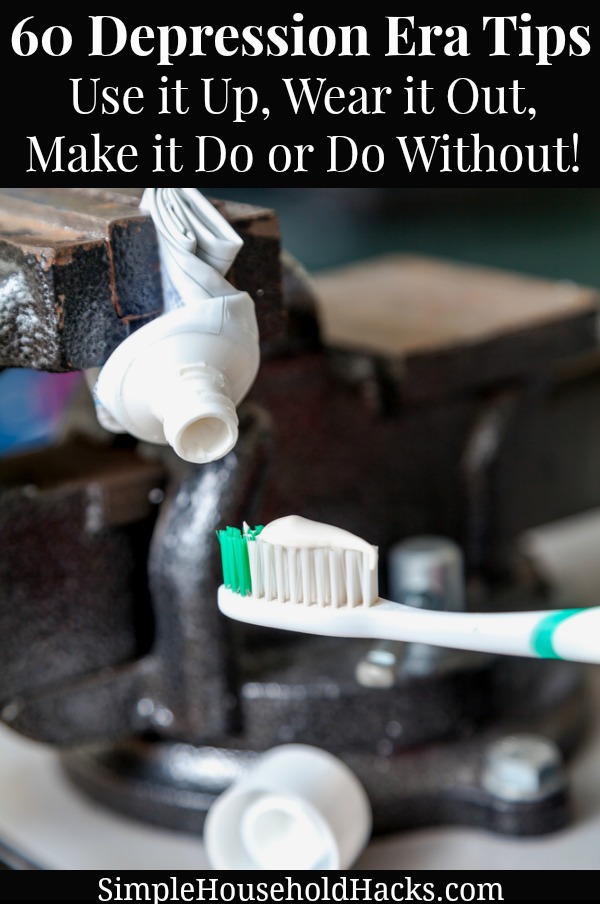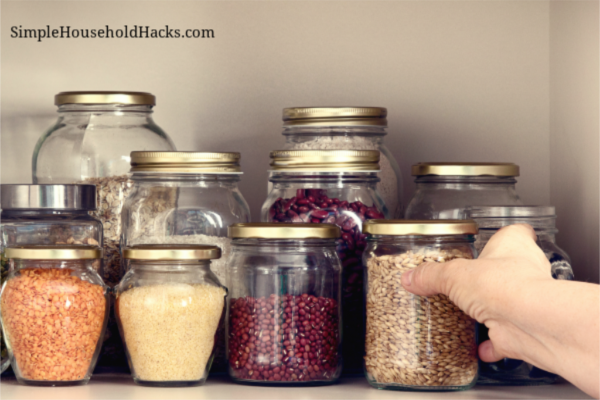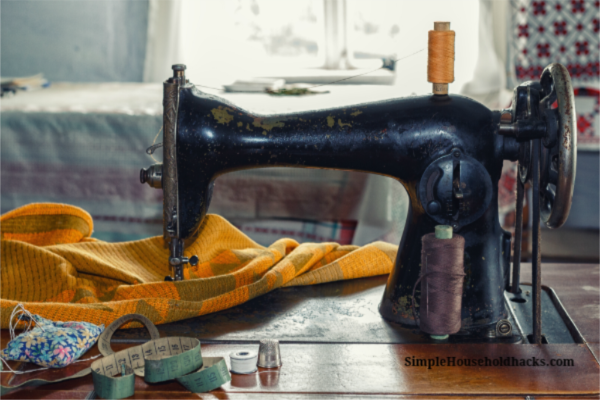Grandma and Grandpa had money saving skills. Use these frugal hacks from the Great Depression Era to cut your spending and live on a budget.

So often we are careful when making large purchases, but then waste a lot of money on many unnecessary small purchases. My Grandma would say we were “pound wise and penny foolish”. To truly live frugally we have to watch every penny. We can give living like Grandma a try if we really want to save money. Saving during the great depression meant avoiding spending money unless it was absolutely necessary.
Frugal Hacks from the Great Depression Era
Just because these frugal living tips come from the 1930’s doesn’t mean that they are not still applicable today. With some minor modifications, you can use these thrifty living ideas from the Depression Era to save money now. In fact, it is probably easier to both save money and make money now than it was during your Grandparents and Great-Grandparents time. The internet and the wide variety of available resources make it much easier for us to find ways to save money. Our ancestors had no choice, the hard part for us is making the commitment to do so.

Depression Era Tips for Saving Money on Food
Food is one of the areas where we have the greatest control over how much we spend. Using shopping and cooking tips from the Great Depression can greatly reduce how much money you spend each month. Great depression recipes were creative and made use of inexpensive ingredients.
1. Stop Eating Out
If your Grandma is like mine, she can feed the family for a week (or longer) on the amount you spent the last time you ate out! Use your day off to make a meal plan, go grocery shopping, and cook some meals ahead of time, so you are less likely to stop for takeout on busy nights.
2. Cook from Scratch
There were very few convenience foods in the depression-era. People made what they used from scratch for the most part and buying bread was very rare. This money saving tip is something that can be applied to today and will save you a bundle.
3. Cut back on meat in your meals.
Beans, lentils, rice, and mushrooms can all be used to stretch dishes. Oatmeal is a great meat extender in meatballs and meatloaf.
4. Buy the whole chicken
When you do buy meat buy a whole chicken or a whole roast instead of smaller cuts. You will save money by purchasing meat in larger or whole cuts. Roasts can be cut up into smaller pieces and a whole chicken can be cooked once and then used to create 3 to 4 meals.
5. Use the bones to make broth.
Keep a soup stock bag in the freezer. It makes a great recipe starter and it’s like getting something practically free from a meal you already ate. You can also get bones really cheap from a butcher to make this as well.
6. Don’t waste food
It seems so simple, but food waste is one thing that adds up after a while in a grocery budget. Make only as much as your family or yourself will actually eat. If you have leftovers, have a plan for them so they don’t end up in the trash.
7. Buy your food in bulk
Buying food in larger amounts is a sure fire way to save money and something folks were accustomed to doing during the great depression. This is especially true for things you use frequently like sugar, flour, spices, seasonings, and other dry goods. They will last for a very long time, too.
8. Batch cook
Batch cooking is a great way to save money, but also save time in the kitchen and was a big part of great depression living, especially if you have a larger family. Bulk cooking can work for any family size, though and is perfect for those that just want to make meals in a flash without much prep throughout the week.
9. Have a baking day
Just like batch cooking, having a baking day can help you save money on common baked goods you will use such as bread, rolls and even lunch box desserts. You can make loaves of bread for pennies on the dollar and freeze for later.
10. Learn how to preserve food
Canning is an excellent way to get the most out of your dollar especially if you enjoy saving money by purchasing vegetables and fruits in bulk. When the season is over, you will have some to get you through the winter and less to buy at the store.
11. Stock your pantry and freezer
Keeping a well-stocked pantry and freezer is a way to help you stretch money, too. When you find a good buy, get more than you need right now and freeze it. Just be sure you don’t buy more than you can use before freezer burn comes in or you will be wasting it and your money, too.
12. Eat breakfast at home.
I can’t tell you how much money I wasted going through the drive-thru for breakfast before work. That $5 adds up very quickly and most breakfast foods are so low cost so it doesn’t make sense. Boil some eggs and have them for taking with you along with some toast. I also love to make parfaits, overnight oats and waffle PB & J sandwiches for quick breakfasts on the go.
13. Pack your lunch.
Just like with breakfast, lunch can be another big budget breaker. I felt I was simply wasting money by not packing my own food. Make it the night before so it’s easy to grab in the morning and you won’t be tempted to skip it.
14. Make your own coffee.
You can make coffee at home so much cheaper than any drive-thru. Even if you buy all the special gadgets for it, it will pay off in not spending it at the coffee house very quickly.
You can find Depression Era recipes in Clara’s Kitchen: Wisdom, Memories, and Recipes from the Great Depression

Grow Your Own Food
When I talked with my grandparents, great grandparents and my husband’s grandparents about how they survived during the great depression, they all said the same thing, “We did better than many because we had a garden and raised chickens.”
15. Plant a Vegetable Garden
A garden is not only a wonderful way to save money on produce, but it is a great way to spend time alone or with your family. If you have extra bounty from your garden, trade with a neighbor.
16. Grow your own herbs
This can be done even if you don’t have a yard. You can plant herbs in pots on a windowsill. This is a great way to garden in apartments. And since herbs are so expensive at the store this will allow you to save money while still creating flavorful dishes at home.
17. Plant fruit trees
If your yard allows for it, plant some fruit trees. Fruit trees are an excellent way to enjoy your own fresh fruit for eating, baking and cooking with. Once your trees are big, you can start canning the excess fruit. There are some trees that even do well in pots so they can be great for small spaces.
18. Forage
Did you know that most areas allow for some great free foraging for herbs, wild onions, mushrooms, and berries? Join some groups on Facebook to learn more about what’s available in your area for foraging and how to identify.
19. Raise Chickens
One day I want to have my own chickens as they are a great way to have eggs and pest control in gardens. You can even sell extra eggs if your hens are good layers.
20. Compost
Turn your trash into nutrient-rich dirt for your garden for an extra way to be less wasteful and use up everything. Just make sure you add the right things!

Use it Up, Wear it Out, Make it Do, or Do Without!
Most things can have a second life if you let them and get creative. Before you toss something in the trash, ask yourself what else you could do with it or do a quick Google search for another way to use it.
21. Use Everything Up
Don’t let anything go to waste. Use up every drop of toothpaste, makeup, salad dressings, and condiments. Cut packages open if necessary to get the last bits out of it. You may be surprised how much lotion or shampoo is still in that container.
22. Learn How to Make Simple Repairs
It has saved me lots of money and time over the years to learn how to repair stuff myself. From simple household repairs like changing the ‘guts’ in a toilet tank to changing your own oil, you can usually find a video for it on YouTube.
23. Get creative and make do with What You have.
This is another way of saying using everything up, however, one thing everyone did during this period of 1930’s frugality is to find other ways to use something rather than buy something for a problem. For instance, if you need places to store your bulk goods, start saving glass jars from packaging to use rather than buying mason jars for it.
24. Be happy with what you have
It’s really hard in this day and age to not want more. We have so many products, places and things we are always pressured to buy or go to. Consider what you already have before buying something else. Can you use something you already own for that problem? Do you really need it or are you feeling the pressure to keep up with others?

Lend and Borrow
“To God be humble, to thy friend be kind, and with thy neighbors gladly lend and borrow; His chance tonight, it maybe thine tomorrow.” ~ William Dunbar
Don’t let your pride prevent you from borrowing something instead of buying it.
25. Use the library
Many people do not know how much of a resource the local library is nowadays. You can borrow more than books at many locations, too! My local library actually lends out tools, sports equipment, and technology.
26. Look for freebies before buying.
Freecycle is an excellent resource as it is just locals giving away stuff and trading. Amazon Prime members get free books and free movies. Community centers sometimes have a tool loan program.
27. Lend and borrow from your neighbors.
This is something that may seem super obvious, but more and more people are forgetting to do just that these days. Make that connection again!

Reduce, Reuse, Recycle
28. Buy Items Used
I try to buy as much as I can at thrift stores. There are so many usable things available at thrift store including furniture, clothing, appliances, dishes, toys, and even craft supplies.
29. Buy reusable products instead of disposable
We have become such a throwaway society and this has made us less frugal and harder on the environment. Use rags instead of paper towels, cloth diapers instead of disposable and reusable water bottles instead of one-time use ones.
30. Turn old clothes into cleaning rags
I will use any stained or unraveling towels as rags as well as T-shirts. The tees are great for dusting areas such as computer screens and TVs.
31. Save plastic containers and use them again
How many of our Grandmas had a butter container she used as food storage? Get in the habit of looking for ways to reuse the containers that come in your home instead of throwing them away.
32. Repurpose glass jars
I use glass jars from baby food and pasta for so many things around my home. They are excellent for storing bulk spices in, nuts and bolts in the garage and even making my own lotions and using them for storage.
33. Accept Hand Me Downs
While we often think of hand me down clothing going from the oldest child to younger kids, that is not the only form of hand me downs. As my oldest son went through a growth spurt in his teens, I took his old boots and my daughter raided his old sweatshirts. Maternity clothes can be passed from friend to friend. Old furniture is often available just for being willing to pick it up.

Repair and Make it Last
34. Repair instead of replacing
Get in the habit of seeing if you can fix a broken item instead of replacing it. Learn to mend and sew and you will be able to make your clothing last for years and years.
35. Buy classic clothing styles
Skip the latest fashion trends. Your clothes will look out of date in a year or less. When you must buy new clothing lean towards timeless styles that you can wear for years or even decades.
36. Wear an apron or a smock or a jumper
Keep your clothes from getting stained while doing messy jobs by wearing an apron or a smock. Consider picking up an old jumper from a thrift store and wear it while you are working on your car or painting.
37. Wash your clothes less often
Most people don’t consider that washing clothing shortens their life little by little. If it doesn’t actually need washing because it isn’t soiled or smelly, consider wearing it another time or two before tossing it in the wash.
38. Consider line drying clothes
Drying outdoors makes them last longer and saves energy. Plus, they smell amazing!
39. Reheel old shoes.
The days of people always getting shoes repaired seems to almost be a lost practice, but if you are lucky enough to still have a cobbler in town, use it! It’s like getting a new pair, again.
40. Add water to your liquid soaps to stretch them.
My husband does this when the bottle gets about 1/3 of the way down. It stretches things quite a bit and you don’t even need that high of a concentration to get most jobs done, anyway.
41. Learn how to change the oil and make simple car repairs.
Taking care of your car will make it last longer. Keep driving your old car as long as it will go instead of buying or, even worse, leasing a new car.

Money Saving Tips from the Great Depression Era
42. Don’t use shopping as entertainment or retail therapy
This is a hard habit to break, but it will break your bank if you don’t. Find other ways to spend your time that are free and consider donating time to volunteer work to feel good, instead.
43. Look for Free Entertainment
The world is filled with free entertainment if you know where to look. Get free movies from the library and go to free community events such as concerts and festivals.
44. Don’t use credit
While building credit is important, don’t rely on it too much. Instead, pay for only what you can afford with cash or debit.
45. Save for the things you want.
Rather than finance everything you want, save for them and pay in cash. Not only will you be more debt-free, but you will feel pride in doing so.
46. Layer up in the winter
Don’t crank up that heat. Instead, wear layers and make sure to wear socks to keep warm indoors.
47. Cut cable
We broke up with cable a couple of years ago and haven’t missed it at all. If you must watch something, choose a low price streaming service or even a free one. There are many places you can watch movies for free with just a few ad breaks.
48. Cut your landline and/or downgrade your cell phone
Ask yourself if you really need a landline or all the data your cell phone plan includes. If you truly don’t need it, try it without and see how much you will save.
49. Look for Ways to Save Energy
Turn off electronics when not in use. Turn off the lights. Set a timer on your air conditioner and heater, so it isn’t running when you are not at home. Be aware of ghost energy usage and use plugin strips to turn off electronics at night at the strip.

Make it Yourself
Access to the internet makes it easier than ever to make things yourself. Before buying something new, do a search for a DIY version and see if it is possible to make it yourself for less.
50. Make Homemade Cleaning Products
You can make cleaning products for very little cost using common pantry staples such as vinegar, baking soda, castile soap, and even lemon juice.
51. Make your own personal care products
I make a lot of my own cosmetics such as dry shampoo, lotions, creams, and face care. The cosmetic industry is a multi-billion dollar industry and you can save yourself so much by making your own instead of buying.
53. Make your own curtains
You can easily make your own curtains, valances by simply sewing a few straight lines. Sewing curtains is a DIY project that even a beginning seamstress can do. You can use sheets to save money on fabric costs.
54. Make shelves
With a little bit of checking out a night class or even a YouTube video, just about anyone can make simple items like shelving for their walls. Get re-purposed word for something quirky, stylish and sustainable.
55. Create your own accessories
Jewelry and accessories can be made with very little skill and they are one of a kind when you do it yourself. You can turn any outfit into a more dressy one with the right pieces.
56. Make your own home decor
I love to craft my own home decor. I often find stuff at thrift stores and do simple makeovers like adding my own coat of paint.

Great Depression Era Tips for Making Money
It is easier now to make money than it was during the Great Depression. Not only do we have a better economy, but we have many more resources available to us.
57. Embrace odd jobs
During the Great Depression, no one was too proud to take a second job and menial jobs were not looked down on. My husband’s grandfather often told us about his job shoveling coal during the Depression Era. He went on to become an Admiral and author but was still proud of the time he spent shoveling coal.
58. Sell stuff you no longer need
Get rid of clutter and clear up space for a more simple way of life by selling anything you don’t need or want anymore online, with a good old-fashioned yard sale or by placing an ad in a penny saver.
59. Work from home
Do you have a skill like writing, editing, or coding? There are so many ways to make money online these days. Do some digging around and find a way to work from home that fits your lifestyle and talents.
60. Provide a service
Can you clean homes, mow lawns, repair computers, sew, bake, tutor, teach music lessons, or babysit? Use the skills you have to make money.